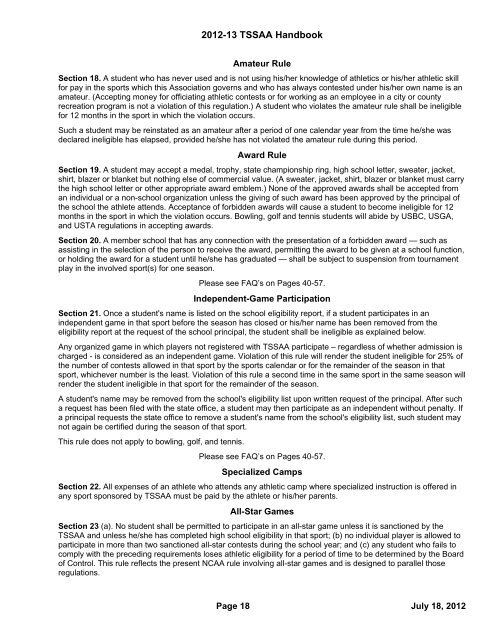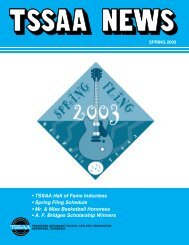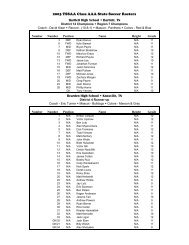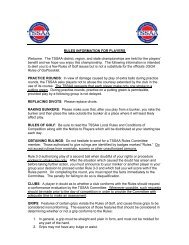2012-13 TSSAA Handbook
2012-13 TSSAA Handbook
2012-13 TSSAA Handbook
You also want an ePaper? Increase the reach of your titles
YUMPU automatically turns print PDFs into web optimized ePapers that Google loves.
<strong>2012</strong>-<strong>13</strong> <strong>TSSAA</strong> <strong>Handbook</strong><br />
Amateur Rule<br />
Section 18. A student who has never used and is not using his/her knowledge of athletics or his/her athletic skill<br />
for pay in the sports which this Association governs and who has always contested under his/her own name is an<br />
amateur. (Accepting money for officiating athletic contests or for working as an employee in a city or county<br />
recreation program is not a violation of this regulation.) A student who violates the amateur rule shall be ineligible<br />
for 12 months in the sport in which the violation occurs.<br />
Such a student may be reinstated as an amateur after a period of one calendar year from the time he/she was<br />
declared ineligible has elapsed, provided he/she has not violated the amateur rule during this period.<br />
Award Rule<br />
Section 19. A student may accept a medal, trophy, state championship ring, high school letter, sweater, jacket,<br />
shirt, blazer or blanket but nothing else of commercial value. (A sweater, jacket, shirt, blazer or blanket must carry<br />
the high school letter or other appropriate award emblem.) None of the approved awards shall be accepted from<br />
an individual or a non-school organization unless the giving of such award has been approved by the principal of<br />
the school the athlete attends. Acceptance of forbidden awards will cause a student to become ineligible for 12<br />
months in the sport in which the violation occurs. Bowling, golf and tennis students will abide by USBC, USGA,<br />
and USTA regulations in accepting awards.<br />
Section 20. A member school that has any connection with the presentation of a forbidden award — such as<br />
assisting in the selection of the person to receive the award, permitting the award to be given at a school function,<br />
or holding the award for a student until he/she has graduated — shall be subject to suspension from tournament<br />
play in the involved sport(s) for one season.<br />
Please see FAQ’s on Pages 40-57.<br />
Independent-Game Participation<br />
Section 21. Once a student's name is listed on the school eligibility report, if a student participates in an<br />
independent game in that sport before the season has closed or his/her name has been removed from the<br />
eligibility report at the request of the school principal, the student shall be ineligible as explained below.<br />
Any organized game in which players not registered with <strong>TSSAA</strong> participate – regardless of whether admission is<br />
charged - is considered as an independent game. Violation of this rule will render the student ineligible for 25% of<br />
the number of contests allowed in that sport by the sports calendar or for the remainder of the season in that<br />
sport, whichever number is the least. Violation of this rule a second time in the same sport in the same season will<br />
render the student ineligible in that sport for the remainder of the season.<br />
A student's name may be removed from the school's eligibility list upon written request of the principal. After such<br />
a request has been filed with the state office, a student may then participate as an independent without penalty. If<br />
a principal requests the state office to remove a student's name from the school's eligibility list, such student may<br />
not again be certified during the season of that sport.<br />
This rule does not apply to bowling, golf, and tennis.<br />
Please see FAQ’s on Pages 40-57.<br />
Specialized Camps<br />
Section 22. All expenses of an athlete who attends any athletic camp where specialized instruction is offered in<br />
any sport sponsored by <strong>TSSAA</strong> must be paid by the athlete or his/her parents.<br />
All-Star Games<br />
Section 23 (a). No student shall be permitted to participate in an all-star game unless it is sanctioned by the<br />
<strong>TSSAA</strong> and unless he/she has completed high school eligibility in that sport; (b) no individual player is allowed to<br />
participate in more than two sanctioned all-star contests during the school year; and (c) any student who fails to<br />
comply with the preceding requirements loses athletic eligibility for a period of time to be determined by the Board<br />
of Control. This rule reflects the present NCAA rule involving all-star games and is designed to parallel those<br />
regulations.<br />
Page 18 July 18, <strong>2012</strong>






